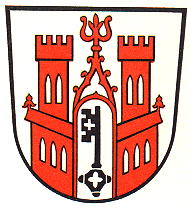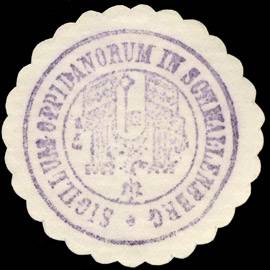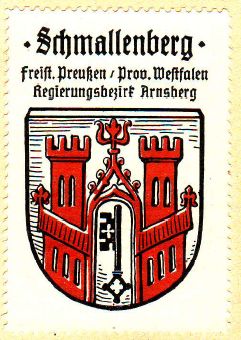Schmallenberg: Difference between revisions
Knorrepoes (talk | contribs) m (Text replacement - "{{media}}" to " {{de1}} {{media1}}") |
Knorrepoes (talk | contribs) m (Text replacement - "{{de}}" to "") |
||
| Line 1: | Line 1: | ||
'''SCHMALLENBERG''' | '''SCHMALLENBERG''' | ||
Revision as of 05:16, 27 December 2022
SCHMALLENBERG
State : Nordrhein-Westfalen
District (Kreis) : Hochsauerlandkreis (until 1975 Meschede)
Amt : Amt Schmallenberg
Additions : 1975 Berghausen, Bödefeld-Freiheit, Bödefeld-Land, Dorlar, Fleckenberg, Fredeburg, Grafschaft, Lenne (partly), Oberkirchen, Rarbach, Wormbach
| German | Silber eine rote Burg mit zwei Zinnentürmen und einem Tor, dessen Giebel in einer Lilie endet. In der Toröffnung findet sich ein aufrechter schwarzer Schlüssel. |
| English | No blazon/translation known. Please click here to send your (heraldic !) blazon or translation |
Origin/meaning
The arms were granted on December 16, 1909 and again on November 25, 1975.
The arms were officially granted in 1909, but date from the 14th century. Schmallenberg received city rights in the early 13th century from the Archbishop of Köln. The oldest known seal dates from 1243 and shows a castle with a banner. In late 13th century the present composition appears on coins, followed in the early 14th century on seals.
The arms show a city gate with in the gate a key, the symbol of St. Peter and the State of Köln. St. Peter is the patron saint of Köln. The actual shape of the gate has changed considerably during the centuries. The arms as granted in 1909 show the composition as used on the local seal from 1344.
| Seal from around 1900 |
The arms by Hupp in the Kaffee Hag albums +/- 1925 |
Literature: Stadler, 1964-1971, 8 volumes; Belke, 1986


